
The Story
Once upon a time there was a hashtag: “#collcons” (collaborative consumption). A hashtag from the Web 2.0 era that allowed researchers, bloggers, entrepreneurs and activists to connect around the idea of a Sharing Economy. Sharing Economy as a way of relating to each other and in communities based on the principles of trust, belief in the commons, sharing of resources and the use of technology for good. Among others, this hashtag and the French blog “consocollaborative”, started by Antonin Léonard, brought together a group of people in Paris who met for monthly for dinners to exchange ideas and make sense of the rising sharing phenomena.
Those conversations were happening online too: catalyzed through similar blogs in Spain (“Consumo Collaborativo”, by Albert Canigueral) and Germany (“KoKonsum”, by Daniel Bartel) as well as in the Startup, Commons and Research communities. An invitation gathered them all to join the conversation in person in Paris in 2012.
It’s challenging to imagine this nowadays, but back in the day the sharing economy was an opportunity promising to change the way we engage with each other and how we do business by using the available resources without needing to exploit, and offering on- and offline meeting spaces for strangers. During the waves of discontent that travelled the world after the 2008 financial crisis, technology allowed groups of people across Europe and the world to imagine a more beautiful reality.
From this collective energy, one core idea emerged: we wanted to better understand the change underway and accelerate the transition to a more meaningful society by empowering the actors of the collaborative economy from across the globe.
That was the start of Ouishare, a network of people around Europe and the Americas working towards a utopian promise: a ‘Collaborative Society’, made up of communities of peers that work, create and live together.
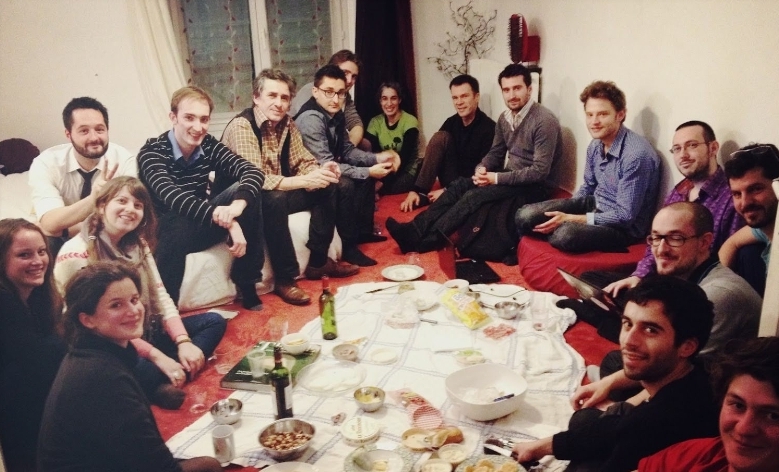
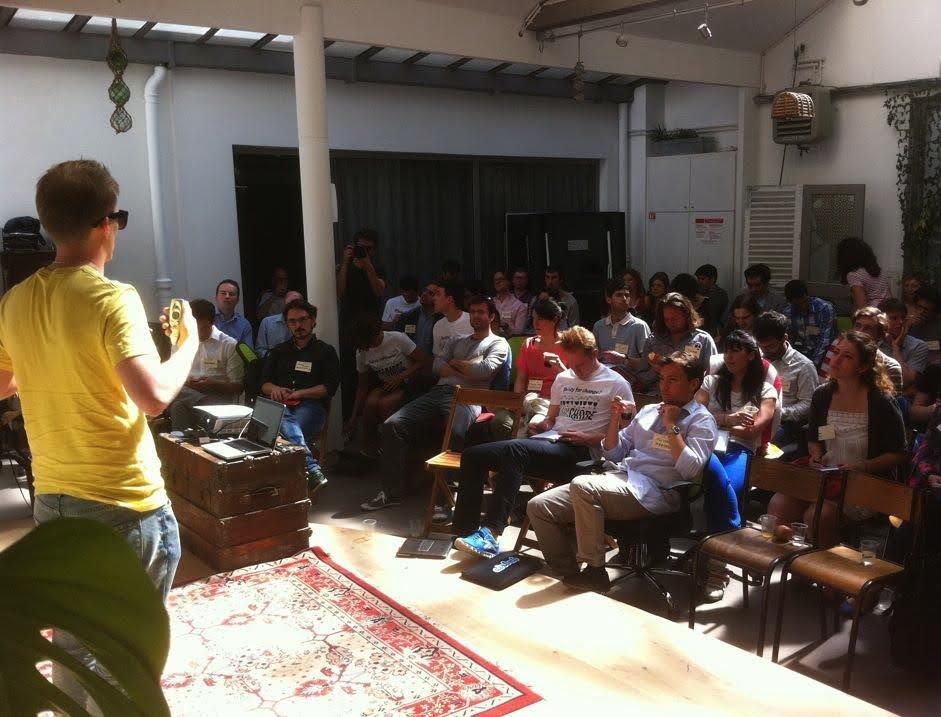
Ouishare felt like an English garden cultivated from French soil full of exotic plants exported from all around the world yet thriving in chaotic harmony.
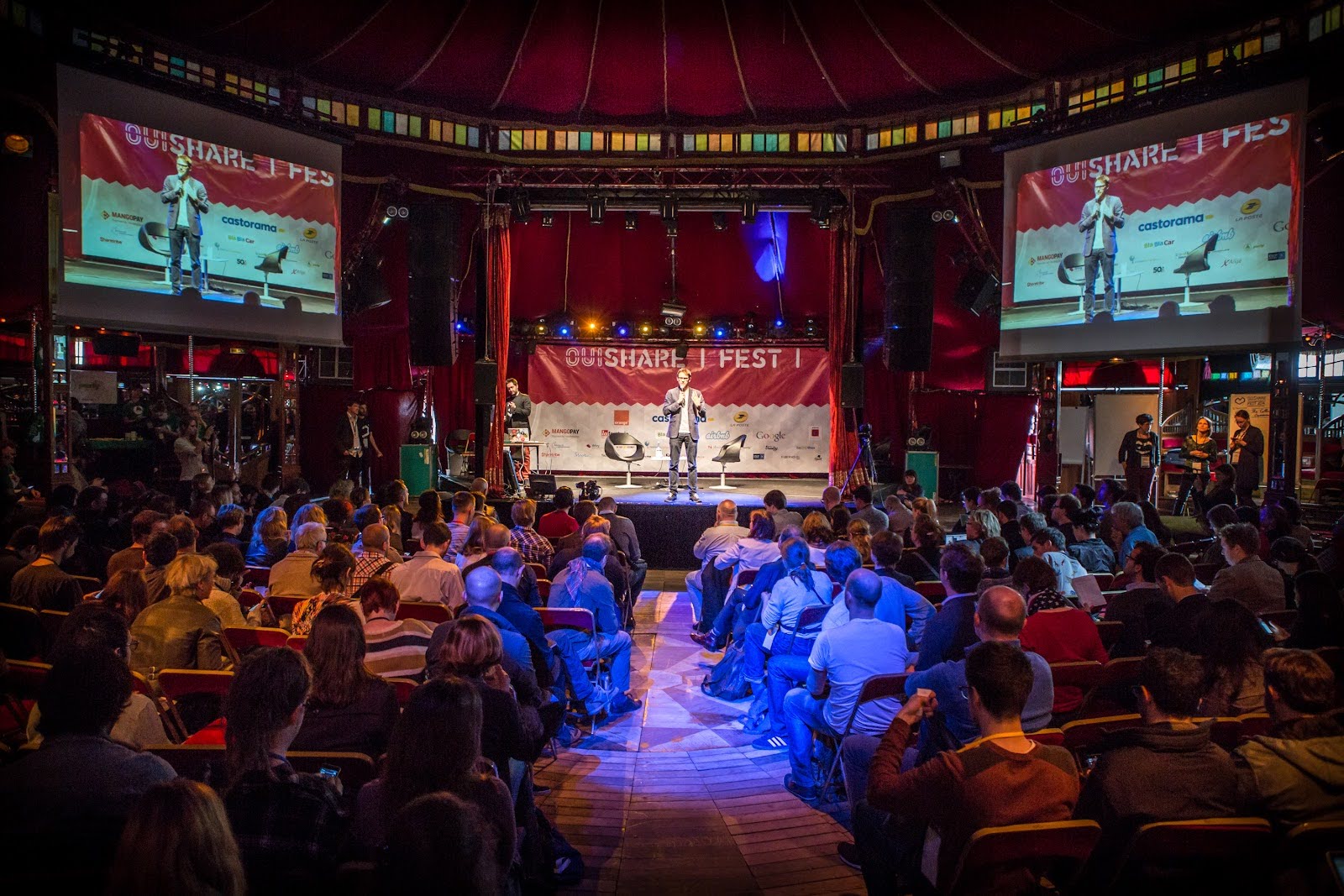
Blossoming - the golden times
During the 10 years that followed we built an international network of committed members. We discussed and revealed divergent opinions about the collaborative economy and its potential to transform society. We gathered researchers, activists, innovators and decision-makers from around the world at one-of-a-kind events such as Ouishare Fest in Europe, gathering thousands of people in Paris and Barcelona, Colaboramerica in Brazil, Quito Comparte in Ecuador, a festival in Medellín, AltShift in Cairo and Eco2Fest in Québec. Some other memorable gatherings were the POC21, an innovation camp that lasted for five weeks and hosted 100 makers, designers and innovators to develop a Proof of Concept of a truly sustainable society; Le Grand Barouf du Numerique, that dealt with democracy and the Future of Work Barcelona.
Among many other initiatives, we explored social challenges beyond myths and clichés by doing research on the ground about the impact of the collaborative economy in rural areas, and how people living in underprivileged areas use digital technology. We ran speculative design processes with citizens to explore scenarios for the future of mobility, housing, care, education and work.
Being part of Ouishare around 2012 felt like finding a home: a lot of like-minded people who were enthusiastic to look ahead and shape a technology-enabled future, while - at the same time - were ready to engage in a deep change in desires, expectations, and social norms.
As time went by, the community and network grew and what was a handful of dreamers became a massive, white-hot, core of optimism and energy that contributed to shaping a decade of innovations spanning from startups to leading corporate firms. In the following years and still today, countless times, I met and talked to people who reported knowing each other at Ouishare events - like the Ouishare fest - who subsequently went on to become core members of incredibly impactful startups or managed profound changes in their organizations.
After a decade, in hindsight, we may say that a lot of such optimism was naive and that the changes we advocated for have not been structural at all. But if I look at the value of the relationships and interactions we facilitated, nurtured, and incubated it's hard to consider that less than transformative for an entire scene, certainly in Europe but - I believe - even beyond.
At some point, we even decided to bury the collaborative economy: we let go off the concept we were founded around , because technology had been co-opted once more to serve the purpose of capital accumulation. So we started working on other more specific challenges of our time. Through that effort, Ouishare contributed to deciphering and producing open knowledge on topics such as the territorial ecologic transitions, third places, the digital transformation, social precarisation, inclusive futures of work, climate resilience, decentralised governance.
Burying the Sharing Economy was for us like sawing off the branch we were sitting on: It generated internal controversy and at the same time it allowed us to change gears and evolve.
We had to sit with the discomfort of ambiguity quite frequently and had to embrace, fight and make peace with contradictions about our ways of doing things internally and externally. Ouishare has never been perfect.
From the beginning, we worked hard to organise ourselves differently, we knew that how we did things mattered as much as what we did. So we experimented and learned, and failed, and learned again: how to make decisions together, how to be guided by values that served us as operating principles across three continents, how to meet, how to collaborate. Our governance structure was designed to reflect our vision of an emergent organisation that was in permanent beta and adapted to rapidly changing environments. Ouishare was decentralized, remote and self-organized from day 1. Influenced by concepts of self-organization, stigmergy and distributed leadership, we aimed to keep contributions models and our governance structure as organic and agile as possible.
What attracted me most to Ouishare in its beginnings was that we wanted to reinvent what it means to be an ‘organization’, based on distributed power and inspired by principles from Rick Valkvinge’s book “Swarmwise”. None of us had heard of ‘new ways of organizing’ concepts….we just jumped straight into the experiment and were learning, stumbling and evolving as we go.
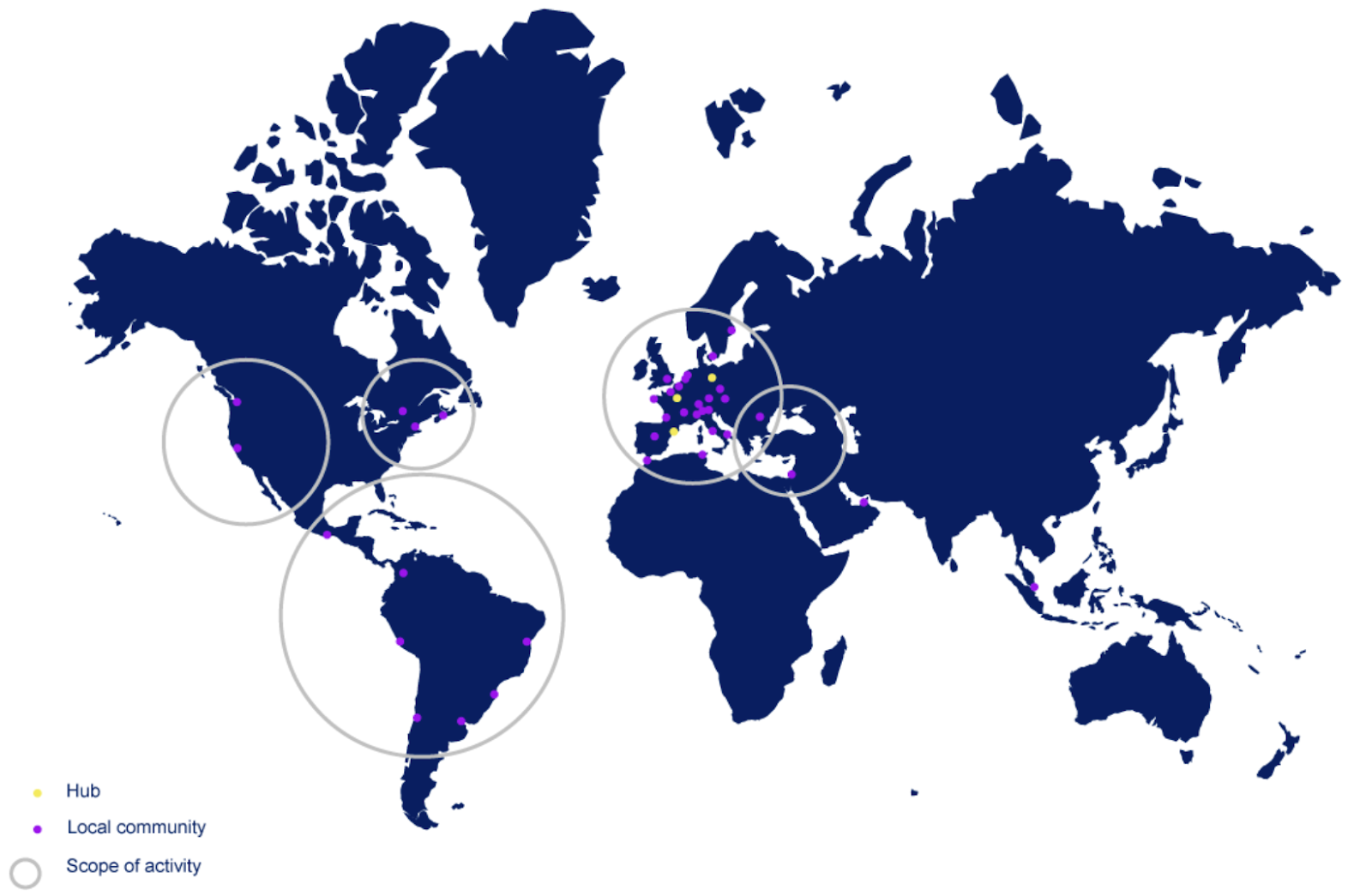
We have been a reference for many other networks around the world on how to organise an emergent network and the structures and practices that guided us for ten years can still be found in our handbook. As Ouishare matured, it took the shape of a network of local communities, and it was heavily influenced by the many events we organised over the years. Those events were some of the most tangible manifestations of our network and the best accelerator of ideas and encounters, as well as an irresistible attractor for new members. Our intention was to connect and learn globally, but act locally.
Ouishare was a big social experiment which created a strong relational fabric, deep relationships, friendships and even love partnerships.
Ouishare has also evolved thanks to partnerships built on trust and collaboration: for example, the French cooperative insurance company MAIF became a long standing partner and ally in many projects, without whose support Ouishare’s evolution would have surely been different.
In fact, Ouishare's business model was an original creation designed to ensure the long-term financing of our public-interest activities. It was based on the projects we carried out with public and private organisations, which grew out of the discussions and desires that emerged over the course of our relationships, and the profits of which enabled us to finance the projects as well as the association's infrastructure (legal, technical, administrative, accounting and financial). Ouishare was also a hybrid between for and non-profit, when it comes to finances. We were often seen as "hippies with a business plan" by the business community and the alternative ecosystem sometimes looked at us as being too business centred.
Sprouting from fertile soil
We might have struggled and had continuous conversations about what Ouishare actually was - besides an experiment. However, one of the definitions that resonated widely and, in retrospect, one of the main impacts it had is that of an Incubator of People. Ouishare members’ lives changed because of Ouishare. We learned that life and work could be more beautiful and meaningful than what we had been taught at school and university. We invented jobs that didn’t exist, we had agency to make decisions and to make things happen. Ouishare was the first network that most of us had ever been part of, we learned new ways of being and working together and this catapulted us to other jobs, networks and possibilities.
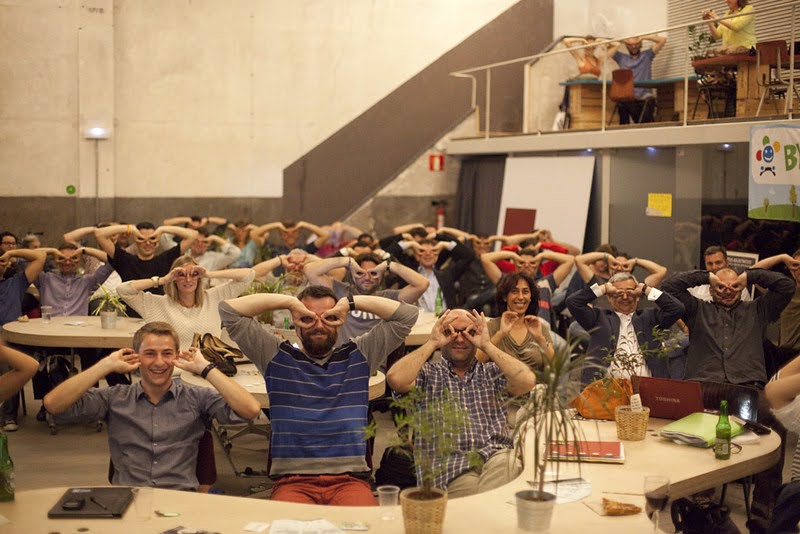
Well-known initiatives were born out of that fertile ground. People gravitated together around engagements and ventures that are still active and relevant today. Several of us are still exploring and supporting what the future of healthy organising looks like and work around that both globally (like Greaterthan and Boundaryless) and locally (like Resiliences). Others grew into impact organisations like La Fabrique des Mobilités or Zero Waste Europe, which contribute to the original Ouishare vision.
The Ouishare way of doing and understanding the world is still alive in these networks, individuals and communities. There are countless projects that were sparked and supported over the last decade that were inspired by Ouishare, and Ouishare lives on in the current work and lives of everyone who was part of it.
Time to compost
After 10 years, we now have many parents among us, Ouishare babies, mature businesses and more, with very different needs than those of the 20-year-olds that started this emergent experiment.
After burying the sharing economy, for almost half of our existence as a network, we became a “how” network: our ways of being together, our values, our experiences and the relationships kept us together. But it became unclear what mission we want to focus on. We only had our values as a common umbrella. The different thematic pockets in the system were more and more difficult to bring together and to make sense of.
In the meanwhile, we also dealt with the tension of a global network and local communities. Many of the original Ouishare members were holding the international relational tissue and so, for many years, connections with members across borders remained. But with time, even if we tried to keep fostering this layer, the local communities became the centre and almost sole way of engaging in Ouishare: Ouishare France, Ouishare Spain, Ouishare Peru, Ouishare Germany, were the last ones left.
We realised that there was no longer a pathway for someone to join Ouishare. One could join a local community, but not “Ouishare” as a network. What did that even mean?
For some, the Covid pandemic accelerated all of these dynamics that ended up separating us.
We had become a group of peers with a long collective history, people that respect and admire each other, and, sometimes, work together. But that’s not an “alive” network or community.
We were always based on emergence and sense-making and we have always taken the brave step, so we also do this now: We end our lifecycle as Ouishare. So we compost Ouishare.
There was no other way for us to honour and celebrate what we have built than to talk about ending things consciously. Closure, once we saw and embraced it as part of the cycle of life rather than the final destination of a linear process became liberating: we take with us what we have learnt, built and experienced to other places to resource them. This is why we rather speak about composting than closing - and now find ourselves in good company of more and more people speaking about “conscious closure”, eco-cycles and regenerative organising.
It has taken us more than two years of process to get here: make-sense of the situation, deal with our emotions, invite the perspectives from the different communities, learn to let go and finally, shape a constructive composting process.
Ouishare was too precious to us to let it fizzle out, as it happens to many networks. Ouishare changed the lives of all of us and so we want to end this cycle with dignity and honour our collective endeavour.
We compost because Ouishare is the most alive space we’ve ever been in, and we hope that through this process other people, organisations and other networks can learn about this beautiful experiment and be inspired and encouraged to keep pursuing their path.
With this legacy website, we would like to offer the knowledge we gathered and produced over ten years to the world, knowing that what you can find here is only a drop compared to the ocean that Ouishare once was.
This composting effort should serve as a liberation of energy, an opening for further emergence, an opening to see where the water will flow.
Thank you for walking with us on this journey - See you in the garden!